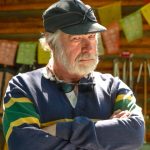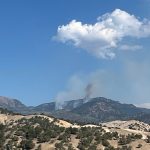Whiting column: Life lessons from a non-golfing father
Personal Responsibility

My father never played golf.
Regardless, in 1962 my eighth-grade summer, he gave me a wood, 7-iron, 10-iron, putter and three Dunlop golf balls in a canvas bag.
“Dad, I don’t know anything about golf.” His response? “You play baseball. How different can it be?”
A rough 9-hole course on Sage Creek was five miles east of town and three miles south of the ranch. I’d seen it but never set foot. Dad said we belonged because it supported the town: civic responsibility.
The next day, after morning chores and lunch, I threw the clubs in the pickup and Dad dropped me off at the course. “I’ll be back before dinner. Go play golf.” I did.
There wasn’t a driving range or practice green. It didn’t matter; didn’t know such things existed. Shorter green grass, surrounded by tall sagebrush, which I learned was No. 9 fairway, attracted me. Dropping the three balls, I started swinging as best I could: occasionally making contact. Thus began a lifetime of golf.
Despite not knowing what constituted a good shot, it was apparent fly balls were better than ground balls. That day, I learned the 10-iron was easiest to hit in the air. Discovery was exciting.
The second day, again on No. 9 fairway, three ladies appeared hitting down the grass toward me. I didn’t think much about it since plenty of other grass was available. Pleasant and encouraging, they provided my first lesson in golf etiquette and appropriate attire. Basketball shorts and no shirt weren’t.
A week later, Dr. Riddell, our dentist, came down No. 9. He led me to No. 1, and explained holes, tee boxes, greens, and scoring. We played the first hole. It must have taken forever, with my swinging several times to Doc’s one. He could play. I learned what a “good” shot looked like.
My best friend was Gordy. I told him about golf, and he expressed interest. Dad was receptive to giving Gordy a ride, too. We shared my clubs, hitting and retrieving the three balls on No. 9 and playing a few holes. Gordy’s father passed when we were in grade school. I knew times were tough in his household. I didn’t know about memberships or green fees but years later found out Dad bought Gordy’s first clubs and paid for him to play until Gordy enlisted after high school.
We were soon playing twice a week. I expressed to Dad that I wasn’t getting better. “No different from baseball or anything else; practice,” he replied. Three days later he came home with a Golf Digest and Ben Hogan’s “Five Fundamentals” saying “Here, get better; it’s up to you.” This led to days and years on No. 9 fairway with Gordy and I reading, looking at photos/drawings asking, “Am I doing that?”
Later that first summer, Dad asked “When are you and Gordy scheduled to work the golf course?” My quizzical look communicated better than my “What?” “There isn’t a staff. All the golfers take turns with the work.” We were ranch kids, driving tractors for years; on-the-job training sitting between our father’s legs. Consequently, we were soon on the fairway mowing schedule. There wasn’t rough; It was either grass or sagebrush. Those not tractor-savvy moved irrigation pipe with an old jeep or fertilized greens. We didn’t graduate to greens’ mower for another year.
People relied on us to show up and do our job. We were the only kids playing but had the same responsibilities as everyone else. As a result, we soon knew all the golfers and they began asking us to play with them. That brought up names. I told Dad Mrs. Howe said call her Opal and Mr. Alsup said call him Bill. That wasn’t acceptable. Respecting your elders wasn’t a new concept. Last names denote courtesy and respect. Years after college, I still addressed them formally.
There wasn’t a golf pro. An old tack shed was “The Corral” where Mrs. Mecham sold Cokes, beer, hot dogs, candy bars and golf balls. Later that first summer, there was a poster for the club championship in the Corral. No one possessed handicaps and I didn’t know the term had any relationship to golf. The divisions were by age. The first was 20-35. Dr. Riddell asked if we were playing in the club championship. I told him we were fourteen; too young. He promptly went into the Corral, took out a pen and added a new bracket: 1- 19.
Young, old, big, small, male, female it didn’t matter. There was only one set of tees. It was my first tournament, A small field: Gordy and I; still sharing clubs. I don’t remember our scores. They couldn’t have been good, but Gordy won on the first hole of sudden death. No. 1 was a par four and Gordy holed his third shot from one 100 yards. It was the first birdie for either of us.
That next Christmas, “Santa” provided my first full set of Wilson clubs, black golf shoes and a dozen Dunlops under the tree.
The next summer, we convinced several baseball teammates to start playing. By our sophomore year we were reasonable golfers. High school golf didn’t exist, but there were area junior tournaments. Dad convinced the school to let us use a school bus if we could find a sponsor/driver. Spike Vannoy, the basketball coach, didn’t play golf, but was willing if we agreed to practice basketball with him in the gym once a week. Deal.
Leaving the house to catch the bus for my first out of town tournament, Dad said “Here, you’ll need these,” and tossed me a sleeve of Titleists. I was still using Dunlops because they cost twenty-five cents. Titleists were seventy-five cents: outside my financial statement. Thanking him, he said “I was told you needed Titleists for a tournament.” Even then, I thought that was cool and appreciated the unexpected extra effort.
Life lessons continued. Practicing after a rain, I missed a putt on No. 8. Walking off the green in disgust, I wanted to “tap” my putter on the green. When I did, the toe of the putter happened to be straight down and buried itself in the wet ground. The momentum was such that the shaft snapped. Gordy and I both gasped. At dinner, I told Dad, expecting him to buy me another. His response, “What are you going to putt with now?” After initial shock, I suggested, “Another one costs $24.” “You have $24?” he replied. Responding “No,” a few seconds of silence told me a different strategy was required. “Will you lend it to me?” “No, but make me a proposal at $2 an hour, beyond your chores and I’ll listen.” A week of putting with my driver and 12 hours fencing the north haystack and re-staining the horse stalls facilitated a new putter. Haven’t thrown a club since.
My 11th grade summer, our Sage Creek course hosted its first junior tournament. Dad asked if parents were allowed. I assured him they were but could only talk to players at the turn or after we signed our scorecards. “Ok I’ll be there” he said. He never missed a baseball or basketball game but had never seen me hit a golf shot. I was playing decently and on No. 9 hit to fifteen feet and missed the birdie putt. Walking to No. 1 to start the second nine, I was whining and grousing around as golfers do. Dad came up beside me and said, “What did you make?” “Four,” I replied. “Isn’t that par?” “Yes.” “Isn’t par what you’re supposed to make?” “Yes.” “Then you’re acting like a damn fool.” Lesson learned.
Tournaments elevated golf in importance. One morning a particularly hot afternoon was forecast. Deciding to practice right after breakfast to avoid the heat, I was walking past Dad toward the pickup when I heard “Did you already move the heifers to the upper meadow?” He knew I hadn’t, but he asked me first. Not wanting to hear “a man always gets his work done first” I was already trotting back to the house to change clothes as I replied, “On my way.” Years later I understood his strategy. He was treating me like a man. Instead of forcefully telling me to get up there and move the heifers as we had decided at dinner last night, he asked me first. Consequently, it was me, telling myself to do it instead of him making me.
My senior summer, Dad watched me at any tournament within a few hours of home. Numerous times I asked if he wanted to hit balls or play, but he always responded negatively. Nevertheless, he was acquiring an understanding of the game and knew a good shot from bad. At the Jackson tournament, No. 18 is a par five with a lake in front of the green. After my drive, I laid up and hit a wedge instead of going for it in two. After the round, Dad asked how far out I was. “190 yards,” I replied. “Can you hit it that far?” “Yes.” “Then why not hit it on the green.?” “If I hit in the water, it’s a penalty,” I explained. “What was your score?” My response of “par” solicited “Was that memorable?” “Not really, I lost by a shot.” “Why not try something special you would remember?” “To win you might have to be willing to lose.”
As I grew older, the lessons continued. Summers between college terms, I returned and worked on the ranch. By this time, I was playing in “men’s” tournaments. One morning we were horseback, pushing the bulls out to McCullough Peaks where they would summer now that their breeding responsibilities had been completed. I must have been mumbling because Dad asked what was up. “I missed 20-foot putts on the last three holes yesterday. If I make one of them, I’m tied for first and in sudden death.” Initially, he didn’t respond, but soon said “When I watch, you step up and make all the short ones. On the longer ones you walk around a lot and make lots of practice swings.” “I don’t miss 4 or 5 footers. I just look and hit it.” Ignorance is not only bliss, but often wisdom. “What if you just did the same on the longer ones. After all, you’re just rolling the ball on the ground?”
Years later, I asked Dad why he had told me to go play golf, given that he never played. “You were a competitive kid and would need an outlet after you grew older beyond watching TV and eating potato chips. We wanted you to experience our family values as you determined what your grown-up values would be.
Thanks Dad.
Bryan Whiting feels most of our issues are best solved by personal responsibility and an understanding of non-partisan economics rather than government intervention. Comments and column suggestions to: bwpersonalresponsibility@gmail.com.

Support Local Journalism

Support Local Journalism
Readers around Glenwood Springs and Garfield County make the Post Independent’s work possible. Your financial contribution supports our efforts to deliver quality, locally relevant journalism.
Now more than ever, your support is critical to help us keep our community informed about the evolving coronavirus pandemic and the impact it is having locally. Every contribution, however large or small, will make a difference.
Each donation will be used exclusively for the development and creation of increased news coverage.









